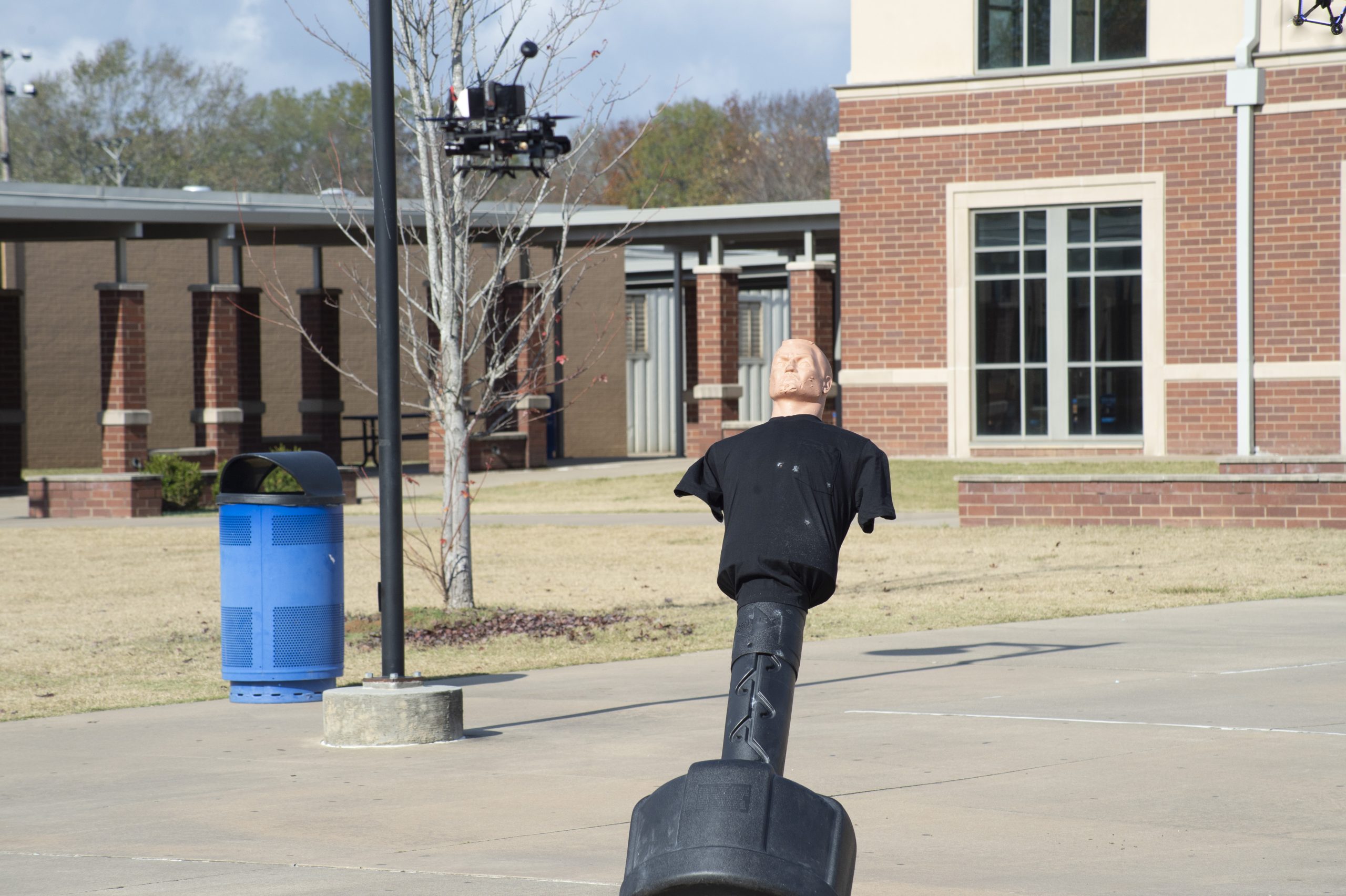Will fast-moving drones with a capability to spray pepper rounds and blare loud sirens be coming soon to an Arkansas school near you? Campus Guardian Angel, a technology startup based in Austin, Texas, certainly hopes so. Drones are the latest proposed solution to America’s school shooting epidemic. Tuesday morning, Campus Guardian Angel demonstrated its drone technology for the first time in Arkansas at Conway High School. “We can respond in five seconds, we can be on the shooter in 15 seconds and we can degrade and incapacitate in 60 seconds,” Campus Guardian Angel CEO and founder Justin Marston said. “And we can do that from a single op[eration] center with incredibly elite talent covering thousands of campuses all at the same time.” Marston said the drones are to be used to incapacitate an active shooter before law enforcement gets onto the scene. He said they are like racing drones, and the company strategically puts the drones in different parts of a school ahead of time to be used when someone calls in to report a school shooter. Marston said the drones are much faster than a law enforcement response. The ones on display Tuesday could go up to 110-120 miles per hour. He said that exercises the company has done show that the drones get to a shooter one minute before law enforcement can. “Our goal is to confront that person, to keep them busy, to degrade them and to ultimately make sure they don’t murder any kids,” Marston said. In part of the demonstration, the drones chased down a fake shooter armed with a fake rifle inside the school. The drones quickly followed the fake shooter into a classroom and flashed flares at him to get him to stand down. Two men from Campus Guardian Angel were piloting the drones, which were very loud and noticeably distracting, which Marston indicated was the point. Marston said the drones can break through windows, and they typically approach a person first with a siren. The drone can tell a shooter through a speakerphone to drop a weapon and get on the ground. If they don’t, pepper spray can be used in order to make it difficult to see. “Then we’ll tell them again, ‘Get on the ground, drop the weapon,’ and if they’re still not doing that, they’re still trying to resist, then we can ultimately hit them at high speed, and that is like getting hit by a baseball bat,” Marston said. The company demonstrated this latter part outside in the school courtyard facing the entrance to the cafeteria. A dummy was placed in the middle of the courtyard. There, two pilots flew two drones towards the dummy and quickly shot baby powder rounds at it from a short distance, which knocked it over. Marston said that in a real scenario, the drones would shoot off pepper rounds. He also said the company is working on a spray similar to bear spray. He said the spray is effective as it doesn’t permanently injure anyone, but it does give them several hours of discomfort. He said the pepper spray is the most extreme effect of the drones. “During all that, we’ll be asking for permission [from law enforcement] to escalate force, but if we see somebody murdering children, we’re going to immediately intervene,” Marston said. “Typically, we will have officers seeing exactly what the drones are seeing through our mobile app while we’re flying.” Marston explained that elite drone pilots, some with law enforcement and military experience, fly the drones from their operating center in Austin. The company creates a model of a school ahead of time so it knows every little detail of a building, giving them a greater understanding of what is occurring in real time than a law enforcement officer who can only see what is immediately around them. Marston said that a roaming pilot goes outside the building with a drone and watches for people who are evacuating a school building. This pilot meets police at the front door to tell them what is happening. A threat tracker figures out who the shooter is and keeps an eye on where they are moving throughout a school. A microphone on the drone allows for conversation between the drone operator and law enforcement. Marston said Campus Guardian Angels test flies them every three months and studies data from the drones to keep them up to date. If anything is wrong, the company replaces the drone. Marston said the drone can differentiate between an active shooter and law enforcement from body language and the way one walks. “The person making decisions is somebody who’s had like 20-plus years of tactical experience,” Marston said. Marston said that the governor’s office and the Arkansas Department of Education helped arrange Campus Guardian Angel’s demonstration at Conway High School. His company has been meeting and having talks with the governor and state education officials about bringing the drones to schools in Arkansas. They are looking for two or three other Arkansas schools where they can stage demonstrations, Marston said. Marston estimates that this program could come to Arkansas schools within the next six months, and that private schools may receive them first. “It really just depends on how the Legislature moves,” Marston said. “We have been talking with the Department of Education here. And so I would just say, if you think this is something that should be tried in Arkansas and you believe there could be value in testing it, reach out to your representative, talk to your elected officials, tell them that you think it’s worth testing out in Arkansas, and we’d love to come here and prove it in reality.” Campus Guardian Angel has been to different states demonstrating how its technology works. Marston said the Texas School Safety Center will soon run an independent study analyzing the technology’s response times. Last week, the Florida Department of Education announced that three school districts in the state would launch a pilot program for the drones. Both Texas and Florida have seen tragic mass school shootings in recent years, with the 2022 Uvalde school shooting and the 2018 Parkland High school shooting. Marston said seeing what happened in Uvalde inspired him in part to gather with Bill King, a former U. S. Navy Seal, to found Campus Guardian Angel. King piloted hundreds of predator drone strikes as part of the War on Terror after 9/11, Marston said. Marston said the company has also met with lawmakers in Georgia and Alabama. The company is planning to deploy drones in 10 schools across the country between January and February 2026. Florida is directing $557,000 to Campus Guardian Angel for its pilot program. Marston told reporters Tuesday that institutions that want the drones can buy the hardware up front or pay for a managed service similar to how one can buy a cell phone up front or on a contract. A box of three drones and the charging system goes for $9,000. The managed service is 25 cents a square foot a year, which comes out to three or four dollars per kid a month. What happens when a shooter is behind a closed door? These drones can break through windows, Marston said. And if a shooter is locked in a closet with no windows, police can open the door with a pole and then the drone will go in. And what happens if the shooter takes aim at the drone? Marston said it is difficult for a person to shoot down a drone. He said tests have shown that about 1 in 100 times someone manages to shoot one down, and that becomes more complicated when one considers that there may be multiple flying at a time or if pepper spray is dispensed. Eric King, Conway High School director of safety and security, said the demonstration Tuesday opened his mind up to different ways to keep children safe in schools. He said anything helps when it comes to protecting children, faculty and staff. While he doesn’t think there have been any threats toward Conway High School that would warrant security of such a magnitude, he said it is good to be proactive. “I’d have to see a little bit more of everything that goes on with it,” Eric King said. “But at the end of the day, I think the majority of our community is for anything that would allow our kids and our faculty to have a safer learning and working environment.”.
https://arktimes.com/arkansas-blog/2025/11/26/texas-company-demos-drones-designed-to-stop-school-shooters
Texas company demos drones designed to stop school shooters



